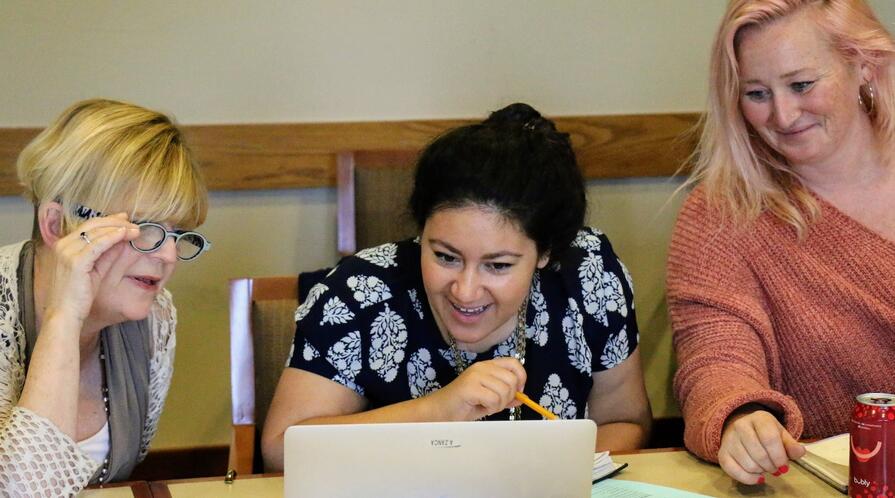This year, the Sejong Korean Scholars Program (SKSP) concluded its sixth year with its largest cohort of 22 students from across the United States. The SKSP is an intensive online course offered by the Stanford Program on International and Cross-Cultural Education (SPICE) at Stanford University for exceptional U.S. high school students who want to engage in an in-depth study of Korea, exploring its history, religion, culture, and relationship with the United States. Students who successfully complete the course earn credit from the Stanford Continuing Studies Program and a Certificate of Completion from SPICE, Stanford University.
Each year from March to June, students in the SKSP online course carry out rigorous coursework that consists of weekly readings, online lectures, assignments, discussion posts, and “virtual classroom” video conferencing sessions, where students engage in live discussion with each other and a guest speaker who is an expert-scholar on the topic of the week. As their culminating final project, students write independent research papers which are printed in journal format at the conclusion of the course.
The SKSP online course offers a unique opportunity for high school students to study Korea and U.S.–Korean relations in a college-level-type course that draws on the wealth of expertise and scholarship on Korean Studies at Stanford University. Top scholars, experts, and former diplomats at Stanford University as well as other universities in the United States provide thematically organized online lectures. The themes for each week include traditional Korean culture, religion, colonial history, the Korean War, post-war recovery, North Korea, modern South Korean society and its educational system, and Korea’s transnationalism. In addition to the recorded online lectures, the guest speakers for the weekly virtual classroom sessions engage in discussions with students and provide answers to their questions.
The co-instructors for the course, as well as guest speakers, often note the quality and maturity of students’ thoughtful insights and questions. Co-instructor HyoJung Jang has noted that “the talented and engaged high school students who participate in the SKSP online course bring their intellectual curiosity, critical thinking skills, and enthusiasm for learning about Korea and its popular culture. On top of their full academic load at their respective high schools across the country, these students go above and beyond to commit to SKSP’s demanding coursework and participate fully in the course as Korea scholars-in-training.”
“Over the past four months, our students have formed a community where they actively engage in intellectual discussions with each other—exchanging their ideas, thoughts, reflections, experiences, and perspectives on various topics,” commented co-instructor Jonas Edman. “For instance, some students contributed their own interpretations and explanations for the stark difference between the Taiwanese colonial experience and memory of Japanese rule and that of Korea. When discussing the issue of ‘comfort women’ during Japanese colonial rule in Korea, one student shared a personal story about his great-great-grandmother’s similarly painful experience under foreign rule in Eastern Europe and powerfully advocated for the importance of justice. Other students shared about their assessments of the roles of the U.S. and South Korean leaders—in addition to the roles played by North Korea, China, and Russia—on the outbreak of the Korean War and its aftermath.”
Alongside their academic engagement with each other, students have also bonded over their shared interests in Korean food and popular culture, namely “K-pop, K-dramas, and K-movies.” Some students chose to write their final research papers on analyzing Korean popular culture. Other discussions on the modern Korean education system have even incorporated students’ personal observations of the education issues portrayed in a popular Korean drama. These interests are encouraged, as students are urged to creatively explore the topics most interesting to them for their final research paper.
One of the strengths of the SKSP online course is that it encourages high school students to consider different perspectives on various issues, think critically about those different perspectives, and develop their own informed opinions. Reflecting on her participation in the course, Chloee Robison, a high school student from Indiana, said, “SKSP was a unique opportunity to explore my interest in Korean history. Even though I am not of Korean heritage, I felt deeply connected to the course material, and I found the lectures to be quite informative and engaging. Coming from a region that is largely homogeneous, hearing the perspectives of diverse-minded students opened my eyes to issues and ideas that I would have otherwise been blind to. I am so grateful to everyone involved in the course, and I would recommend it to all students who wish to challenge themselves and expand their knowledge of Korean history and culture.” Chloee’s research project on Korea’s March First Movement earned first place in Indiana’s National History Day competition.
The popularity and demand for Stanford’s SKSP online course on Korea grows each year. Interested high school students are encouraged to apply early for the program. The application period is between late August and early October each year for enrollment in the online course the following year. The online application can be found on the SPICE website at sejongscholars.org.
To be notified when the next Sejong Korean Scholars Program application period opens, join our email list or follow us on Facebook and Twitter.
The Sejong Korean Scholars Program is one of several online courses for high school students offered by SPICE, Stanford University, including the China Scholars Program, the Reischauer Scholars Program (on Japan), and the Stanford e-Japan Program.
Related article:















 Participant Hellie Mateo poses with a book she made by hand using traditional Japanese book-binding methods.
Participant Hellie Mateo poses with a book she made by hand using traditional Japanese book-binding methods.



